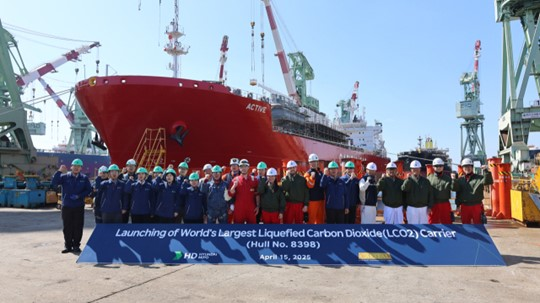On April 16, HD Hyundai Mipo held a launching ceremony for the first of a series of four 22,000 m3 liquefied carbon dioxide (LCO₂) carriers to be built for Greek shipping company Capital Gas Ship Management Corp (Capital Gas).

The vessel commenced construction on August 9, 2024 and is expected to be delivered later this year following completion of final outfitting and commissioning. This is the largest capacity LCO₂ carrier ever ordered globally.
With a length of 159.9 meters and a breadth of 27.4 meters, the vessel is designed for the transportation of carbon dioxide, as well as a wide range of liquefied gas cargoes such as liquefied petroleum gas (LPG) and ammonia (NH₃).
The new vessel adopts ice-resistant design (ice class 1C) technology, which allows safe navigation in ice seas; it is equipped with three “Bi-lobe” carbon dioxide storage tanks, which can stably maintain a low-temperature and high-pressure environment of minus 55 degrees Celsius and 5 times higher than atmospheric pressure.
It is also equipped with a 2,500kW onboard shore power system (AMP) and a nitrogen oxide reduction (SCR) system to reduce emissions of air pollutants such as fine dust and sulfur oxides. In addition, the vessel is designed with an ammonia reservation for future conversion to an ammonia-powered vessel, enabling carbon-neutral operations.
It is understood that Capital Gas has ordered 22,000 m3 LCO₂ carriers from HD Hyundai Mipo in July 2023 (2 vessels) and February 2024 (2 vessels), with a total order value of approximately $300 million. And the two orders have slightly different unit shipbuilding costs of $70 million and $80 million, respectively. Of these, the first 2 vessels are scheduled to be delivered sequentially in the second half of 2025 and the remaining 2 vessels are expected to be delivered by November 2026, respectively.
HD Hyundai-related personnel said, “We are conducting research and development of environmentally friendly technologies to improve the future competitiveness of our shipbuilding and offshore engineering divisions, including the development of the world’s largest LCO₂ carrier.”


